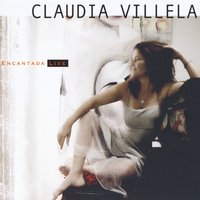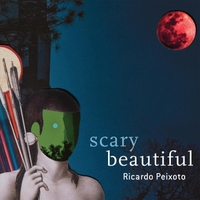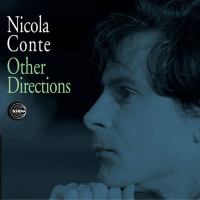Home » Jazz Articles » From Far and Wide » Back to Brazil: Part Three
Back to Brazil: Part Three

San Francisco’s Brazilian music scene has been well established for several decades. A number of notable musicians have relocated to the Bay Area, and this informal colony of Brazilian émigrés has forged propitious relationships with San Francisco’s equally renowned Latin and jazz communities.
 A singer who needs no introduction, Eliane Elias sculpts a predictably sensual soundscape on Love Stories (Concord). The nine-track project features a string orchestra and lush arrangements by Rob Mathes, unobtrusive rhythm section chores by a cadre of Brazilian percussionists, and the steady hand of bassist Marc Johnson. The slinky French film opening track, "A Man and a Woman," establishes a mood of 1960s-era relaxed romanticism that prevails throughout most of the session. In recent years, the São Paulo native has focused more on vocalizing than on her considerable keyboard abilities, and her breathy style is fetching indeed. When she occasionally puts her pianistic skills in the fore, the result is a jolt of energy that keeps the program from overly relying on its ballads-Bossa-and-strings format. On Roberto Menescal's Bossa standard "Little Boat," Elias lets her fingers do some serious talking to pleasing effect. The Frank Sinatra standard "Come Fly With Me" is an album highpoint, notable for its rhythmic drive, blues-tinged piano solo and the leader's more energized vocal attack. "Angel Eyes" is another memorable track, enhanced by Mathes' particularly persuasive string writing. It all adds up to Elias at her alluring best.
A singer who needs no introduction, Eliane Elias sculpts a predictably sensual soundscape on Love Stories (Concord). The nine-track project features a string orchestra and lush arrangements by Rob Mathes, unobtrusive rhythm section chores by a cadre of Brazilian percussionists, and the steady hand of bassist Marc Johnson. The slinky French film opening track, "A Man and a Woman," establishes a mood of 1960s-era relaxed romanticism that prevails throughout most of the session. In recent years, the São Paulo native has focused more on vocalizing than on her considerable keyboard abilities, and her breathy style is fetching indeed. When she occasionally puts her pianistic skills in the fore, the result is a jolt of energy that keeps the program from overly relying on its ballads-Bossa-and-strings format. On Roberto Menescal's Bossa standard "Little Boat," Elias lets her fingers do some serious talking to pleasing effect. The Frank Sinatra standard "Come Fly With Me" is an album highpoint, notable for its rhythmic drive, blues-tinged piano solo and the leader's more energized vocal attack. "Angel Eyes" is another memorable track, enhanced by Mathes' particularly persuasive string writing. It all adds up to Elias at her alluring best. San Francisco's Brazilian music scene has been well established for several decades. A number of notable musicians have relocated to the Bay Area, and this informal colony of Brazilian émigrés has forged propitious relationships with San Francisco's equally renowned Latin and jazz communities. Typically, many of the same names pop up in the supporting cast on sessions led by various Brazilian artists. This kind of collective mindset and familiarity generally produces compelling projects.
 Vocalist and composer Claudia Villela is the kind of singer who just reaches out and grabs the listener's attention. Her flawless vocalese excursions, perfect pitch and willingness to take chances make her a rare commodity. Encantada (Live) (Taina Music) is the stylistic polar opposite of the Elias' Love Stories—an adventurous, gritty, funky in-your-face mixture of Brazilian folkloric modes and the free spirit of avant-garde jazz. There are hints of vintage Flora Purim, Hermeto Pascoal and Egberto Gismonti in the air, but Villela and her cohorts do an excellent job of refreshing that decades-old stylistic perspective, tempering exuberance with the intimate, recital hall-quality readings. Guitarist Ricardo Peixoto, another Bay Area Brazilian stalwart, is a particularly effective partner for the vocalist. Villela's compositional talents are also impressive, and her originals nicely complement covers of works by Villa-Lobos and Edu Lobo. The high level of innate musicianship on display here is truly remarkable.
Vocalist and composer Claudia Villela is the kind of singer who just reaches out and grabs the listener's attention. Her flawless vocalese excursions, perfect pitch and willingness to take chances make her a rare commodity. Encantada (Live) (Taina Music) is the stylistic polar opposite of the Elias' Love Stories—an adventurous, gritty, funky in-your-face mixture of Brazilian folkloric modes and the free spirit of avant-garde jazz. There are hints of vintage Flora Purim, Hermeto Pascoal and Egberto Gismonti in the air, but Villela and her cohorts do an excellent job of refreshing that decades-old stylistic perspective, tempering exuberance with the intimate, recital hall-quality readings. Guitarist Ricardo Peixoto, another Bay Area Brazilian stalwart, is a particularly effective partner for the vocalist. Villela's compositional talents are also impressive, and her originals nicely complement covers of works by Villa-Lobos and Edu Lobo. The high level of innate musicianship on display here is truly remarkable.  Guitarist Peixoto updates his discography with Scary Beautiful (Moving Finger Productions), a showcase for his acoustic and electric guitar wizardry. The supporting cast includes saxophonist Paul McCandless, percussionist John Santos, keyboardist Marcos Silva, and Villela, among other stars of the Northern California jazz, Brazilian and Latin music scenes. Peixoto masterfully balances a number of stylistic tendencies, creating a sonically rewarding result in the process. At times, there's a hint of Afro-Caribbean rhythm in the blend. The mesmeric title tune, with strings arranged by Luiz Brasil, offers another perspective, with a contemporary classical feel. Elsewhere, the guitarist tiptoes precariously close to the shallow waters of smooth jazz territory without getting wet. Rhythmically tart Brazilian jazz fusion is embraced on "Morro da Paixão," which features Rio-based trumpeter Jessé Sadoc in a blistering solo outing. Scary Beautiful is an accessible and attractive effort that covers many stylistic points of view—all of them impressively.
Guitarist Peixoto updates his discography with Scary Beautiful (Moving Finger Productions), a showcase for his acoustic and electric guitar wizardry. The supporting cast includes saxophonist Paul McCandless, percussionist John Santos, keyboardist Marcos Silva, and Villela, among other stars of the Northern California jazz, Brazilian and Latin music scenes. Peixoto masterfully balances a number of stylistic tendencies, creating a sonically rewarding result in the process. At times, there's a hint of Afro-Caribbean rhythm in the blend. The mesmeric title tune, with strings arranged by Luiz Brasil, offers another perspective, with a contemporary classical feel. Elsewhere, the guitarist tiptoes precariously close to the shallow waters of smooth jazz territory without getting wet. Rhythmically tart Brazilian jazz fusion is embraced on "Morro da Paixão," which features Rio-based trumpeter Jessé Sadoc in a blistering solo outing. Scary Beautiful is an accessible and attractive effort that covers many stylistic points of view—all of them impressively.  Keyboardist Marcos Silva, a longtime San Francisco resident, is known for his driving, joyous spin on Brazilian jazz fusion and his fondness for a large arsenal of electric keys and synthesizers. On Brasil—From Head to Toe (Self Produced), he demonstrates some maturation in his choice of instruments, and employs these devices more judiciously than in the past. The result is a recording that's instantly appealing and one that should have a considerable shelf life.
Keyboardist Marcos Silva, a longtime San Francisco resident, is known for his driving, joyous spin on Brazilian jazz fusion and his fondness for a large arsenal of electric keys and synthesizers. On Brasil—From Head to Toe (Self Produced), he demonstrates some maturation in his choice of instruments, and employs these devices more judiciously than in the past. The result is a recording that's instantly appealing and one that should have a considerable shelf life. Silva's use of flute, played by Gary Meek, and keyboard unisons to sketch modes related to the folkloric rhythms of rural northeastern Brazil is a winning approach. Drummer Mauricio Zottarelli and electric bassist Scott Thompson provide a rhythm section pulse that skillfully blends Brazilian traditions with West Coast funk. Guitarist Peixoto is featured on classical guitar, backing Meek on soprano sax on Silva's haunting, melodically captivating Bossa-style ballad "It's Gone." Silva wisely tapped Swiss harmonicist Gregoire Maret for a solo on "New Life," another lovely ballad and one that identifies Ivan Lins as the leader's primary influence as a composer. The session's soothing closer, "Spring," features a 12-piece string section and reflects the kind of symphonic music association Antônio Carlos Jobim so brilliantly achieved on his early 1970s album Urubu. The track is a genuine surprise and leaves one with the impression that Silva should strongly consider further exploring this orchestral idiom on future projects. "Spring" creates a luxurious mood that is not easily dismissed.
 Brazilian vocalist Rita Figueiredo partners with Cuban-American guitarist/composer/arranger and singer Benji Kaplan on Benji & Rita (Self Produced). The 14-track program is a sonic wake-up call that announces the arrival of a true effort to create music without easily recognizable stylistic markers. The classically trained Figueiredo boasts a rich, powerful voice. One can easily image her cast in the comedic role of an opera buffa production. Kaplan writes elaborate arrangements that make use of an array of brass, woodwind, mallet and string instruments. The result recalls some of the large-scale orchestral work undertaken by Hermeto Pascoal in the early 1970s. Imagine the kind of traveling minstrel show captured in the film Bye Bye Brazil. Add a sugary dollop of flirtatious cabaret influences and the grit of rustic Brazilian folk rhythms, and you will be close to the concept—a chamber music experience with a heavy dose of Brazilian flower-power extravagance and disparate rhythmic touchstones.
Brazilian vocalist Rita Figueiredo partners with Cuban-American guitarist/composer/arranger and singer Benji Kaplan on Benji & Rita (Self Produced). The 14-track program is a sonic wake-up call that announces the arrival of a true effort to create music without easily recognizable stylistic markers. The classically trained Figueiredo boasts a rich, powerful voice. One can easily image her cast in the comedic role of an opera buffa production. Kaplan writes elaborate arrangements that make use of an array of brass, woodwind, mallet and string instruments. The result recalls some of the large-scale orchestral work undertaken by Hermeto Pascoal in the early 1970s. Imagine the kind of traveling minstrel show captured in the film Bye Bye Brazil. Add a sugary dollop of flirtatious cabaret influences and the grit of rustic Brazilian folk rhythms, and you will be close to the concept—a chamber music experience with a heavy dose of Brazilian flower-power extravagance and disparate rhythmic touchstones.  Another name that will likely be new to all but the most fervent Brazilophile is guitarist and composer Luciano Franco. A native of Fortaleza, a city far removed from the cultural meccas of Rio de Janeiro and São Paulo, Franco is attracting attention today with Sonho ou Canção (Dream or Song) (Self Produced), a lavish 15-track program that features a different vocalist on every cut and a raft of topflight instrumentalists. Franco's guitar work is clean and equally informed by the lineage of the Gilberto/Menescal school and such jazz artists as Jim Hall and Wes Montgomery. Menescal is present on one track, while multi-instrumentalist Arismar do Espírito Santo and bassist Adriano Giffoni, two renowned instrumentalists, are showcased on several performances. The rest of the cast of a dozen or so may be largely unknown to all but hardcore Brazilian audiences, but there is an unfailing level of excellence throughout.
Another name that will likely be new to all but the most fervent Brazilophile is guitarist and composer Luciano Franco. A native of Fortaleza, a city far removed from the cultural meccas of Rio de Janeiro and São Paulo, Franco is attracting attention today with Sonho ou Canção (Dream or Song) (Self Produced), a lavish 15-track program that features a different vocalist on every cut and a raft of topflight instrumentalists. Franco's guitar work is clean and equally informed by the lineage of the Gilberto/Menescal school and such jazz artists as Jim Hall and Wes Montgomery. Menescal is present on one track, while multi-instrumentalist Arismar do Espírito Santo and bassist Adriano Giffoni, two renowned instrumentalists, are showcased on several performances. The rest of the cast of a dozen or so may be largely unknown to all but hardcore Brazilian audiences, but there is an unfailing level of excellence throughout. Part Bossa and part MPB, with a precocious jazz waltz thrown in for good measure, Sonho ou Canção is instantly likeable. The recording reminds this observer of those fortuitous times when an LP was fished out of an obscure record shop in Rio or São Paulo—based not on the artists or repertoire but solely on the basis of a gut instinct that signaled something special was at hand. This is that kind of release: underexposed musicians and unfamiliar melodies but a blissful experience throughout.
 Kerry Politzer is a young Portland, Oregon-based pianist who has long nurtured an affection for Brazilian jazz. On Diagonal: A Tribute to Durval Ferreira (Self Produced), she and a small ensemble celebrate the late composer and guitarist Durval Ferreira's songbook. Politzer dug deep into the composer's work, transcribing 30 of his compositions from Bossa Nova-era recordings to better understand his technique. For this date, she includes eight of Ferreira's best-known songs and adds three of her own original works. Ferreira's style ranges from the bubbly, joyous spirit of tunes like "São Salvador," featuring flautist John Nastos, to the winsome nostalgia of "Moça Flor," featuring the leader's fleet pianistics and soothing vocalizing. She applies the same arranging formula to "E Nada Mais," a catchy but seldom recording Ferreira melody. "Batida Diferente" and "Estamos Aí," both co-authored with harmonica legend Mauricio Einhorn, are the composer's hard-hitting Samba Jazz standards. Politzer does Ferreira's legacy justice on this charming 11-track set that perfectly captures the seductive spirit of classic Bossa Nova and the bebop-grounded vibe of honest Samba Jazz.
Kerry Politzer is a young Portland, Oregon-based pianist who has long nurtured an affection for Brazilian jazz. On Diagonal: A Tribute to Durval Ferreira (Self Produced), she and a small ensemble celebrate the late composer and guitarist Durval Ferreira's songbook. Politzer dug deep into the composer's work, transcribing 30 of his compositions from Bossa Nova-era recordings to better understand his technique. For this date, she includes eight of Ferreira's best-known songs and adds three of her own original works. Ferreira's style ranges from the bubbly, joyous spirit of tunes like "São Salvador," featuring flautist John Nastos, to the winsome nostalgia of "Moça Flor," featuring the leader's fleet pianistics and soothing vocalizing. She applies the same arranging formula to "E Nada Mais," a catchy but seldom recording Ferreira melody. "Batida Diferente" and "Estamos Aí," both co-authored with harmonica legend Mauricio Einhorn, are the composer's hard-hitting Samba Jazz standards. Politzer does Ferreira's legacy justice on this charming 11-track set that perfectly captures the seductive spirit of classic Bossa Nova and the bebop-grounded vibe of honest Samba Jazz.  It is difficult to name an instrument that is less used in jazz than the bassoon. Don't blame Janet Grice for that state of affairs, however. For several decades the noted bassoonist has created space for her instrument to shine in jazz and Brazilian music. On a new recording, the academic, who has a Ph.D. based on her study of the bassoon in Brazilian music history, is joined by a fellow bassoonist and Brazil native, Paulo Siqueira. Proezas For Bassoon (Prowess for Bassoon) (Self Produced) is the result of this unusual union—an 11-track program that's loaded with the kind of tunes that naturally lend themselves to the inherently woody the double reed sound.
It is difficult to name an instrument that is less used in jazz than the bassoon. Don't blame Janet Grice for that state of affairs, however. For several decades the noted bassoonist has created space for her instrument to shine in jazz and Brazilian music. On a new recording, the academic, who has a Ph.D. based on her study of the bassoon in Brazilian music history, is joined by a fellow bassoonist and Brazil native, Paulo Siqueira. Proezas For Bassoon (Prowess for Bassoon) (Self Produced) is the result of this unusual union—an 11-track program that's loaded with the kind of tunes that naturally lend themselves to the inherently woody the double reed sound. The duo sounds particularly comfortable in a choro setting, and the opening track, Pixinguinha's "Os cinco companheiros" (The Five Companions, first recorded in 1940), is masterfully interpreted by the two woodwind artists, and this perky choro gets the program off to a spectacular start. The Moacir Santos tune known in the U.S. as "April Child" is also tailor-made to the twin bassoon thanks to what has been called a "stop-and-go" rhythm. Siqueira is featured on a flute solo here—a multi-instrumentalist, he also plays soprano sax and percussion on the session. On Luiz Bonfa's "Menina Flor," Grice shines in her solo outing, erasing any doubts about the bassoon's ability to hold its own on the improvisational front. Other songs on the menu include Antonio Carlos Jobim's "Meditation," Edu Lobo's "Casa Forte" and "Receita de Samba" by Jacob Do Bandolim, a beloved traditional Samba that remains a much-performed in Brazil. The session closes with a medley of songs that reflect the folk tradition of the northeast of Brazil and such rhythms as the Baião. It's another opportunity to observe and enjoy how the bassoon is a natural fit to a wide range of Brazilian folk, semi-classical, and popular music styles.
 Sofia Ribeiro may call Portugal home, but Brazil is in her heart on Lunga (Self Produced), a passionate reading of stylistically nimble chamber jazz seasoned with Brazilian folk and pop music influences. Colombian pianist Juan Andrés Ospina and his acoustic jazz trio anchor the set. The Bogotá native's ravishing keyboard sorties provide a commanding guiding light throughout, regardless of stylistic dictates.
Sofia Ribeiro may call Portugal home, but Brazil is in her heart on Lunga (Self Produced), a passionate reading of stylistically nimble chamber jazz seasoned with Brazilian folk and pop music influences. Colombian pianist Juan Andrés Ospina and his acoustic jazz trio anchor the set. The Bogotá native's ravishing keyboard sorties provide a commanding guiding light throughout, regardless of stylistic dictates. Ribeiro, who wrote or co-authored eight of the session's 10 tracks, is an exceptionally talented young vocalist. She can nonchalantly pivot from steady, angelic pure tones to emotion-packed scatting and vocalese in a flash. At times she appropriates the essence of Gal Costa's crystalline upper register vocalizing while elsewhere she captures the yearning sensuality and carefully calibrated vibrato of Jane Monheit. The use of a large vocal chorus on several tracks, a staple arranging technique of vintage MPB sessions, effective substitutes for a string section. The choice of guest accordion and harmonica players, who add the rhythmic zest of Brazil's impoverished but culturally distinctive northeast, also pays dividends. On "Voa," with Brazilian accordionist Vitor Gonçalves punctuating the arrangement's jaunty, Baião-inspired rhythmic pulse, the influence of such Brazilian master composers as Edu Lobo and Egberto Gismonti is confirmed. "Sotaque" is rollicking and loaded with hip, insider cultural references, while romantic balladry reigns on "O Meu Chão É Um Tapete" and "If You Knew," with Ribeiro singing in English. Lunga is thoroughly captivating—a true minor masterpiece.
Tags
From Far and Wide
Mark Holston
Kerry Politzer
Bossa Nova
Brazil
Samba Jazz
Sofia Ribeiro
Janet Grice
Paulo Siqueira
Luciano Franco
Benji Kaplan
Rita Figueiredo
Marcos Silva
Ricardo Peixoto
Claudia Villela
Eliane Elias
PREVIOUS / NEXT
Support All About Jazz
 All About Jazz has been a pillar of jazz since 1995, championing it as an art form and, more importantly, supporting the musicians who make it. Our enduring commitment has made "AAJ" one of the most culturally important websites of its kind, read by hundreds of thousands of fans, musicians and industry figures every month.
All About Jazz has been a pillar of jazz since 1995, championing it as an art form and, more importantly, supporting the musicians who make it. Our enduring commitment has made "AAJ" one of the most culturally important websites of its kind, read by hundreds of thousands of fans, musicians and industry figures every month.
























